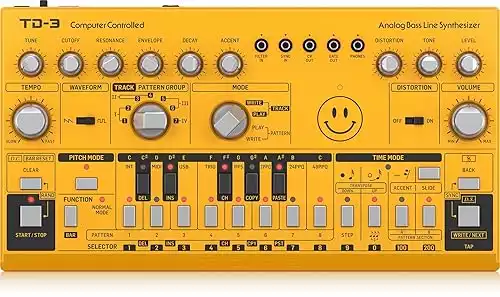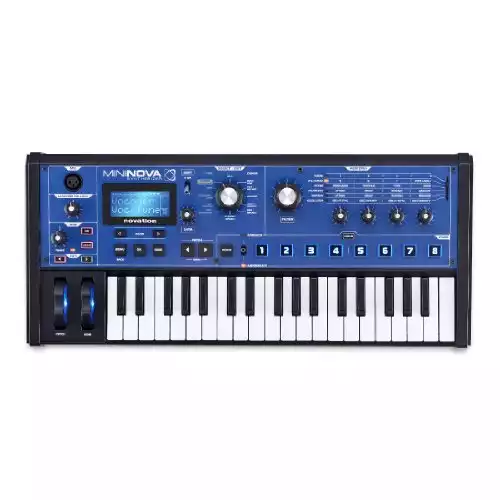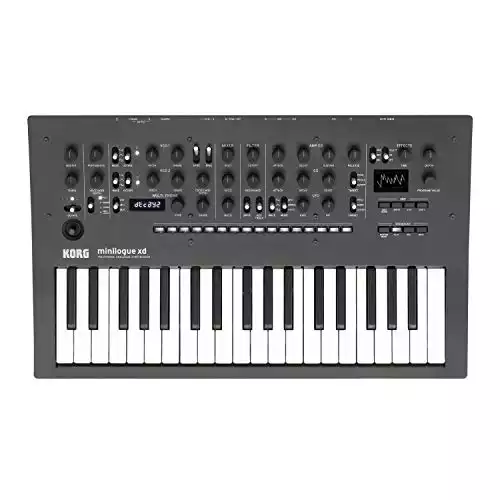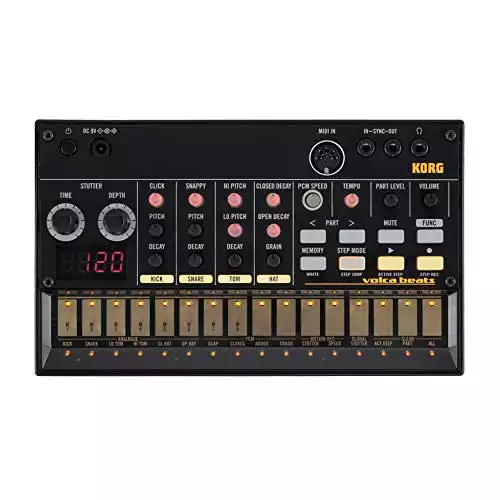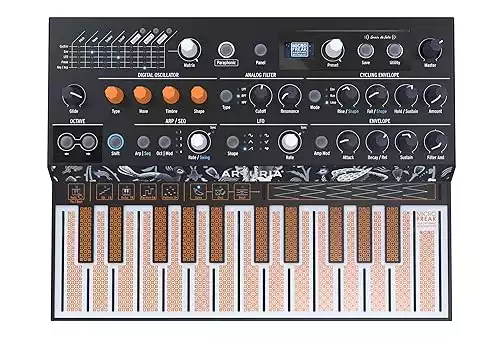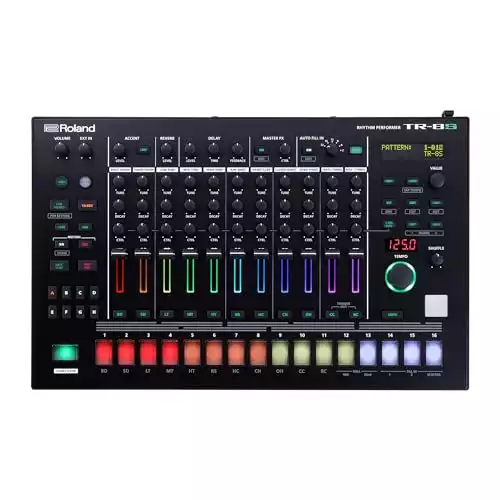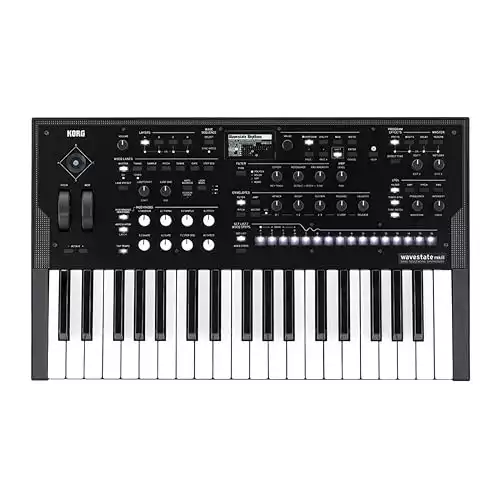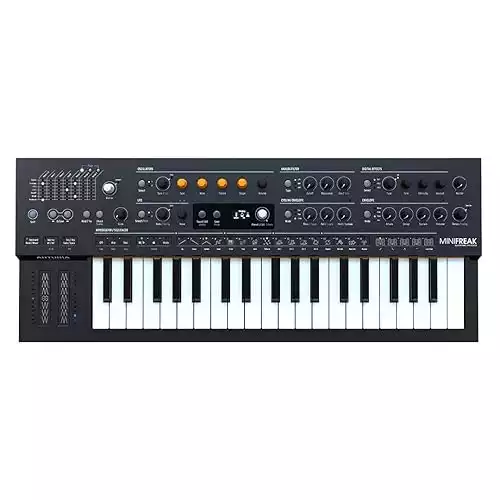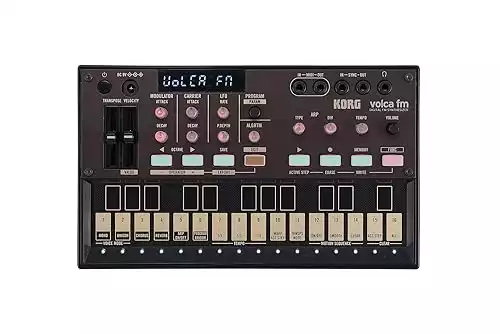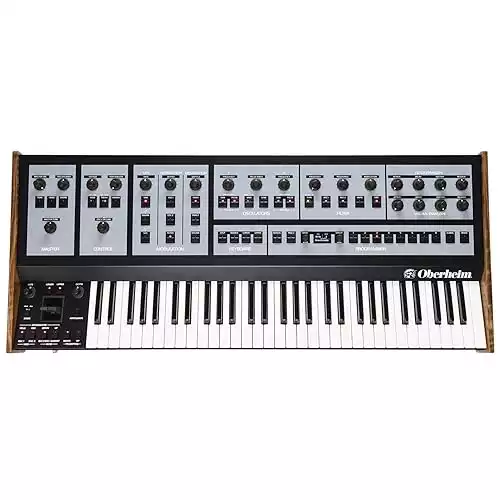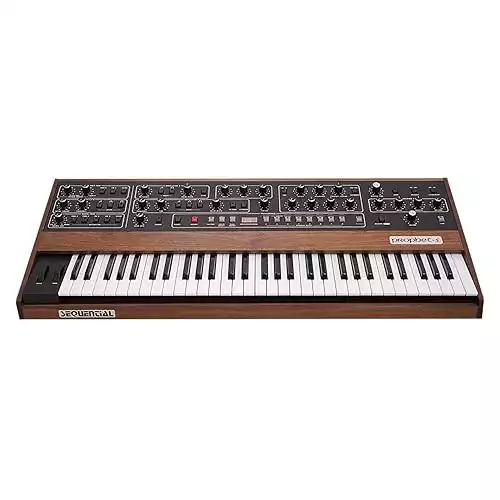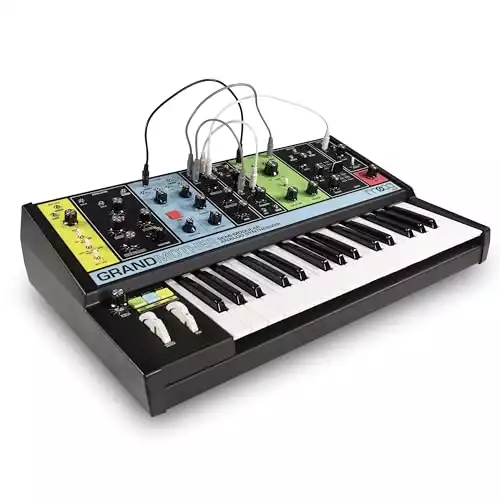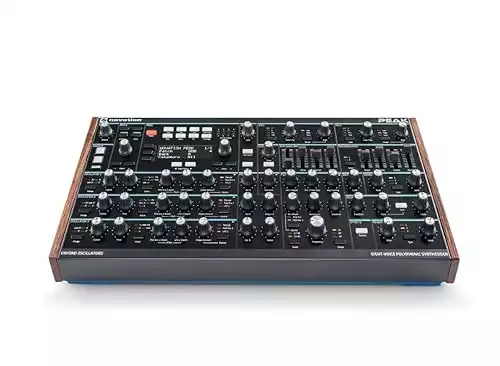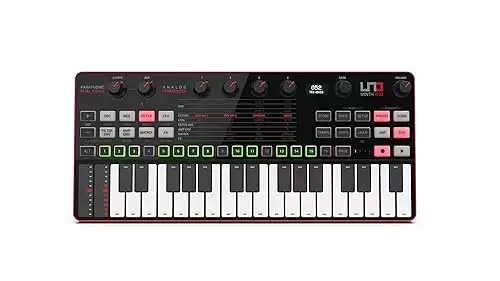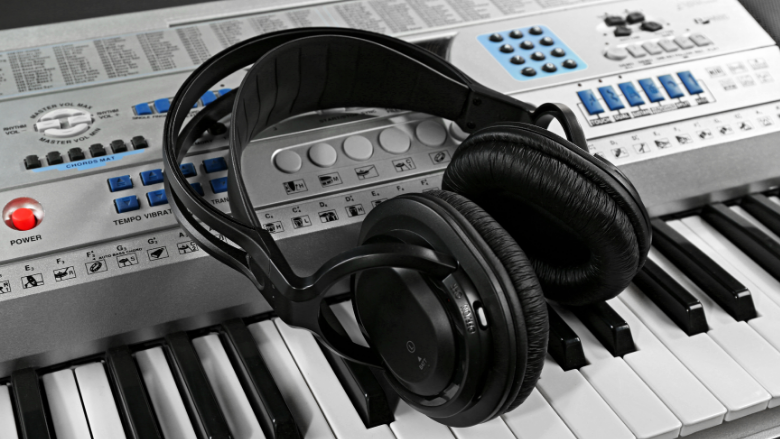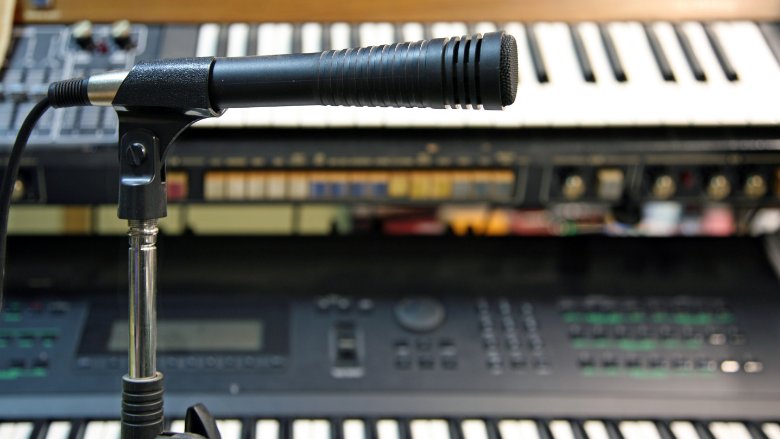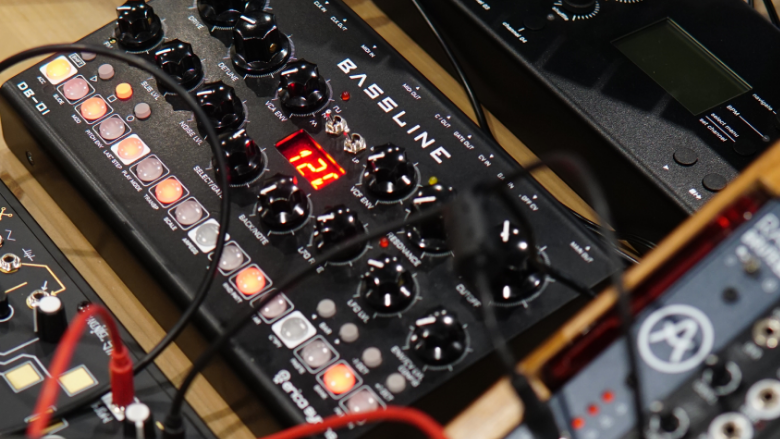Key Learnings:
- Understanding Analog vs. Digital Synths: Learn the strengths of analog and digital sound engines.
- Choosing the Right Polyphony: Determine the importance of polyphonic vs. monophonic synth units based on your musical needs.
- Exploring Modulation and Sequencers: Discover the impact of advanced modulation and sequencer features on your music production.
|
4.6
|
4.7
|
4.7
|
|
Excellent Sequencer Engine |
Powerful Synth Engine |
Flexible Hybrid Engine |
What Are The Best Products?
- Behringer TD-3-AM
- Novation MiniNova
- Korg Minilogue XD
- Korg VOLCABEATS
- Arturia MicroFreak
- Roland TR-8S
- Korg WAVESTATE MK2
- Arturia MiniFreak
- Korg VOLCAFM2
- ASM Hydrasynth Deluxe
- Oberheim OB-X8
- Sequential Prophet-5
- MOOG Grandmother
- Novation Peak
- IK Multimedia UNO Synth Pro
1. Behringer TD-3-AM
This synth is a must-have for any electronic music producer looking for deep bass lines and groove sounds. The Behringer TD-3-AM brings the classic synths' circuitry of the 80s into the modern era.
- Authentic Analog Circuitry - Pure analog signal path for deep, rich sounds.
- 16-Step Sequencer - Easy-to-use sequencer with plenty of user patterns.
- Distortion Circuit - Modeled after the DS-1 for added spice.
Why Someone Should Buy:
This is a perfect choice for anyone looking for that classic acid bass sound that defined single instrument dance music. It’s affordable, portable, and provides authentic analog goodness.Technical Features:
- Analog circuitry with sawtooth and square wave VCO.
- 16-voice poly chain functionality for massive sound.
- Compact design perfect for live and studio use.
Review:
The Behringer TD-3-AM shines with its ability to reproduce those iconic bass lines while offering modern sequencing and distortion options. It is an excellent pick for those who crave a classic analog experience.Verdict:
If you’re after the iconic acid house bassline sound, this synth unit should be at the top of your list.This Product is Perfect For:
- EDM producers
- Software enthusiasts
- Analog synth lovers
2. Novation MiniNova
The Novation MiniNova packs a punch with its 256 onboard sounds, powerful synth engine, and built-in vocoder. It’s the ideal compact synth for live performance or studio use.
- Huge Sound - Up to 18 voices with five effects per sound.
- VocalTune Effect - Use the built-in mic to create unique, pitch-corrected vocal performances.
- Compact Design - Easily fits in any studio setup or gig bag.
Why Someone Should Buy:
This synth’s vocoder and powerful synth engine make it a great choice for live performers and music producers who need versatility and portability.Technical Features:
- 256 sounds with the ability to store 128 user patches.
- Up to 18 voices with effects like reverb, distortion, and delay.
- Includes a gooseneck microphone for the built-in vocoder.
Review:
The MiniNova offers excellent sound in a compact form, with features that appeal to both sound designers and live performers alike. The built-in effects and vocoder elevate its appeal even more.Verdict:
The Novation MiniNova stands out as a flexible and affordable option for musicians looking for a portable synth with powerful sound design capabilities.This Product is Perfect For:
- Vocalists
- Live performers
- Producers on the go
3. Korg Minilogue XD
The Korg Minilogue XD builds on its predecessor with a powerful 4-voice analog/digital hybrid engine and a flexible sequencer.
- Hybrid Sound Engine - Combines analog warmth with digital flexibility.
- 16-Step Polyphonic Sequencer - Perfect for crafting evolving, complex soundscapes.
- Deep Modulation - Extensive modulation alteration features for advanced sound design.
Technical Features:
- 4 voices with a polyphonic step sequencer.
- Built-in digital effects, including reverb and delay.
- Customizable multi-engine for deep sound design.
Review:
The Korg Minilogue XD impresses with its powerful hybrid engine and easy-to-navigate interface, making it ideal for musicians seeking deep sound creation possibilities.Verdict:
This is a perfect synth for musicians who want flexibility and power without sacrificing sound quality.This Product is Perfect For:
- Sound designers
- Ambient musicians
- Electronic producers
4. Korg VOLCABEATS
The Korg VOLCABEATS is a compact, analog rhythm machine that brings the classic analog drum sounds into a portable format, perfect for on-the-go beat-making.
- 16-Step Sequencer - Classic Electribe-style sequencer with memory patches.
- Portable and Battery-Powered - Play anywhere with the built-in speaker and optional battery power.
- Analog Drum Sounds - Six analog parts and four PCM parts for rich drum sounds.
Why Someone Should Buy:
This drum machine is perfect for musicians looking for classic analog drum sounds with the flexibility of modern technology. The portability makes it ideal for mobile producers.Technical Features:
- 16-step sequencer with eight memory patches.
- Sync In and Out for clock synchronization with other Volca units.
- MIDI In for note entry and external sync control.
Review:
The Korg VOLCABEATS excels at creating rich, punchy analog drum sounds while being extremely portable and easy to use. It’s a great addition to any hardware synth setup.Verdict:
An affordable, portable analog drum machine with a vintage feel and modern capabilities.This Product is Perfect For:
- Beatmakers
- Live performers
- Portable music production
5. Arturia MicroFreak
The Arturia MicroFreak is a unique hybrid synth that blends digital oscillators with analog filters, offering a truly innovative approach to sound design.
- Hybrid Sound Creation - Digital oscillators paired with an analog filter for endless sonic possibilities.
- Innovative Keyboard - Velocity sensitive PCB keyboard for expressive play.
- Modulation Matrix - Extensive modulation options for unique sound creation.
Why Someone Should Buy:
The MicroFreak’s innovative design and cutting-edge sound processors make it perfect for adventurous musicians who want to push the boundaries of sound.Technical Features:
- 17 oscillator modes, including physical modeling and wavetable synthesis.
- PCB keyboard with polyphonic aftertouch.
- Modulation matrix with assignable destinations.
Review:
Arturia’s MicroFreak is packed with creative potential. It stands out with its hybrid design and innovative features, making it a fantastic tool for sound designers and experimental musicians. Verdict: The MicroFreak is one of the most versatile and innovative synths available, perfect for those who want to explore uncharted sonic territories. This Product is Perfect For:- Experimental musicians
- Sound designers
- Synth enthusiasts
6. Roland TR-8S
The Roland TR-8S is a forward-thinking drum machine that combines the best of classic TR drum sounds with modern sampling and sequencing capabilities.
- Iconic Drum Sounds - Includes sounds from the legendary 808, 909, and more.
- Sample Import - Allows you to import custom samples via an SD card.
- Performance-Oriented - Built for live use with hands-on controls and effects.
Why Someone Should Buy:
This drum machine is perfect for musicians who want to combine the classic sounds of Roland’s TR series with modern sampling and sequencing features. It’s ideal for live performances and studio production.Technical Features:
- Built-in sounds from iconic TR machines like the 808 and 909.
- Sample import for custom sounds.
- Multiple effects, including reverb, delay, and filters.
Review:
The Roland TR-8S is a powerful drum machine with incredible flexibility. It combines the best of Roland’s classic drum sounds with modern production tools, making it a must-have for any electronic producer.Verdict:
A versatile and performance-ready drum machine with both classic and modern capabilities.This Product is Perfect For:
- Live performers
- Electronic music producers
- Drum machine enthusiasts
7. Korg WAVESTATE MK2
The Korg WAVESTATE MK2 offers an incredibly deep wave sequencing engine with a vast library of sounds, perfect for evolving soundscapes and complex compositions.
- Wave Sequencing Architecture - Create evolving, rhythmic soundscapes.
- 96-Voice Polyphony - Plenty of polyphony for complex compositions.
- Huge Sample Library - Includes 2GB of onboard samples for deep sound creation.
Why Someone Should Buy:
The WAVESTATE MK2 is perfect for musicians who want to create complex, evolving textures and soundscapes. It’s ideal for ambient music, film scoring, and more.Technical Features:
- 96-voice polyphony with wave sequencing architecture.
- Extensive programmable controls.
- 2GB of onboard samples.
Review:
The WAVESTATE MK2 excels in creating complex, evolving sounds. With its deep wave sequencing capabilities and huge sample library, it’s a powerful tool for sound designers and composers.Verdict:
This synth is a fantastic choice for anyone looking to explore deep, evolving soundscapes with a powerful wave sequencing engine.This Product is Perfect For:
- Ambient musicians
- Film composers
- Sound designers
8. Arturia MiniFreak
The Arturia MiniFreak is a dual digital engine hybrid synth unit that offers endless modulation versatilities and a hands-on interface.
- Dual Digital Sound Processors - Create complex, layered sounds with two digital engines.
- Hybrid Design - Features analog filters for rich, warm tones.
- Hands-On Control - Modulation matrix and touch strips for intuitive control.
Why Someone Should Buy:
The MiniFreak is ideal for musicians looking for a versatile hybrid synth with deep modulation and sound engineering capabilities.Technical Features:
- 37 keys with polyphonic aftertouch.
- Dual digital sound processors with analog filters.
- Built-in effects and extensive modulation versatilities.
Review:
The Arturia MiniFreak is a fantastic hybrid synth with a ton of inventive potential. Its intuitively easy-to-navigate and deep sound processors make it an excellent choice for sound designers and musicians alike.Verdict:
A powerful hybrid synth with excellent modulation versatility and intuitive control, perfect for experimental and electronic music.This Product is Perfect For:
- Experimental musicians
- Sound designers
- Live performers
9. Korg VOLCAFM2
The Korg VOLCAFM2 builds on the success of its predecessor with improved polyphony, new effects, and expanded connectivity, making it a compact powerhouse for FM synthesis.
- Improved Polyphony - Doubled from the original model, now with six voices.
- Classic FM Sound - Perfectly reproduces the iconic Yamaha DX7 sound engine.
- Portable and Powerful - Compact and battery-powered, great for musicians on the move.
Why Someone Should Buy:
This synth is a must-have for anyone interested in FM synthesis, especially those who love the classic sounds of the Yamaha DX7 but need something portable.Technical Features:
- 6-voice polyphony with velocity sensitivity.
- 16-step sequencer with motion sequencing.
- Built-in effects, including reverb and chorus.
Review:
The VOLCAFM2 is a fantastic option for musicians seeking that classic FM sound in a portable, affordable package. Its expanded features and polyphony make it a worthy successor to the original Volca FM.Verdict:
A compact yet powerful FM synth with added polyphony and effects, perfect for any musician looking for that DX7 sound on the go.This Product is Perfect For:
- FM synthesis lovers
- Portable music production
- Live performers
10. ASM Hydrasynth Deluxe
The ASM Hydrasynth Deluxe is a dual-engine, polyphonic synthesizer offering unmatched modulation versatility, incredible sound engineering potential, and a robust build quality.
- Dual Sound Engines - Two sound processors, each with three oscillators, dual wave mutators, and filters.
- Polyphonic Aftertouch - 73-note keybed with polyphonic aftertouch for expressive play.
- Advanced Modulation - Extensive modulation matrix with incredible flexibility.
Why Someone Should Buy:
The Hydrasynth Deluxe is the ultimate choice for serious sound engineers and performers who need unparalleled modulation and expressive control in their synthesizer.Technical Features:
- 16 voices of polyphony in single mode.
- Dual sound processors with wave morphing and wave mutators.
- 73-note keybed with polyphonic aftertouch.
Review:
The ASM Hydrasynth Deluxe is an extraordinary synth unit that delivers incredible flexibility, deep sound engineering options, and a highly expressive keybed. It’s a top-tier choice for professional musicians.Verdict:
A powerhouse of sound engineering and modulation, the Hydrasynth Deluxe offers unmatched flexibility and expressive control, making it perfect for advanced musicians.This Product is Perfect For:
- Professional musicians
- Sound designers
- Synth enthusiasts
11. Oberheim OB-X8
The Oberheim OB-X8 is a powerful polyphonic synthesizer that blends vintage tones with modern tech. It features two SEM/OB-X VCOs per voice and a sleek FATAR 61-key keyboard.
- Vintage Analog Sound - 8-voice polyphonic synth with SEM-lineage VCOs.
- Flexible Sound Engineering - Includes SEM and Curtis filters for diverse tonal shaping.
- Sturdy Build - Built with high-quality, heavy-duty materials for long-lasting use.
Why Someone Should Buy:
The OB-X8 is a perfect choice for musicians seeking a legendary analog polyphonic synth with modern enhancements. Its nostalgic sound makes it ideal for vintage synth lovers and professionals alike.Technical Features:
- 8-voice polyphony with full keyboard.
- Two SEM/OB-X-lineage VCOs per voice and SEM-lineage VCFs.
- OLED display for easy navigation of parameters.
Review:
The Oberheim OB-X8 is an excellent option for musicians looking for vintage tones combined with modern design. Its polyphonic capabilities and superior sound engine make it a timeless classic.Verdict:
A high-end synthesizer for professional musicians and synth enthusiasts who demand classic analog tones.This Product is Perfect For:
- Synth enthusiasts
- Professional musicians
- Vintage sound lovers
12. Sequential Prophet-5
The Sequential Prophet-5 reimagines the iconic 5-voice polyphonic synth. Its weighted 61-key FATAR keyboard and two VCOs per voice make it ideal for creating rich analog sounds.
- Iconic Prophet Sound - Features the classic 5-voice polyphonic analog sound.
- Vintage Filter Options - Switch between Rossum and Curtis-designed filters for different sonic characteristics.
- Customizable Presets - Comes with factory presets and space for user-created patches.
Why Someone Should Buy:
This synth is a must-have for musicians who want to capture the essence of the classic Prophet-5 with the flexibility of modern technology.Technical Features:
- 61-key semi-weighted FATAR full keyboard.
- 4-pole low-pass filter and Poly-Mod modulation for deep sound engineering.
- 5-voice polyphonic with two VCOs per voice.
Review:
The Sequential Prophet-5 offers a nostalgic experience with modern reliability. Its rich, warm sound and vintage filter options make it a favorite for professionals and enthusiasts alike.Verdict:
A premium polyphonic analog synth for professionals and those who appreciate classic sound engineering.This Product is Perfect For:
- Synth purists
- Studio musicians
- Analog enthusiasts
13. Moog Grandmother
This semi-modular, monophonic analog synthesizer captures the classic Moog sound. Its 32-key keyboard, built-in arpeggiator, and spring reverb tank make it perfect for sound exploration.
- Analog Sound Engine - Delivers classic Moog tones with monophonic analog circuitry.
- Modular Flexibility - 41 modular patch points allow for endless sound engineering possibilities.
- Built-in Arpeggiator and Sequencer - Provides real-time performance capabilities.
Why Someone Should Buy:
This synth is perfect for musicians who love analog sound and modular flexibility but want something that's also beginner-friendly.Technical Features:
- 32 velocity-sensing full keyboard.
- Spring reverb tank for lush ambiance.
- 41 modular patch points for connectivity.
Review:
The product is a powerful yet approachable synth that’s perfect for modular enthusiasts and beginners alike. Its vintage Moog sound combined with modern functionality makes it highly versatile.Verdict:
A semi-modular analog synth that’s perfect for musicians looking to explore modular sound engineering in a user-friendly format.This Product is Perfect For:
- Modular synth enthusiasts
- Beginners exploring analog synthesis
- Live performers
14. Novation Peak
The Novation Peak is an eight-voice polyphonic desktop synthesizer that combines digital oscillators with analog filters, offering a wide range of sonic possibilities in a compact design.
- Hybrid Oscillators - Features New Oxford Oscillators with digital wavetables and analog-sounding NCOs.
- Extensive Modulation - Includes a 16-slot modulation matrix and two LFOs per voice.
- Compact Design - Desktop form factor makes it ideal for studios with limited space.
Why Someone Should Buy:
The Peak is perfect for musicians who need a polyphonic synth with hybrid analog-digital features in a compact, desktop-friendly format.Technical Features:
- 8-voice polyphony with 3 oscillators per voice.
- 16-slot modulation matrix and 16 direct assignments.
- Onboard effects, including reverb, delay, and distortion.
Review:
The Novation Peak offers incredible flexibility in sound engineering, with a combination of digital oscillators and analog filters that create warm, rich tones. Its desktop design makes it a practical choice for any studio setup.Verdict:
A hybrid polyphonic synth with a compact design and extensive modulation capabilities, perfect for both professional and home studios.This Product is Perfect For:
- Studio producers
- Polyphonic synth enthusiasts
- Musicians with limited space
15. IK Multimedia UNO
The IK Multimedia UNO Synth Pro is a compact analog synth with three oscillators and dual filters. It's perfect for musicians needing a portable, powerful option.
- All-Analog Audio Path - Three oscillators and dual filters offer versatile analog tones.
- Paraphonic Design - 256 presets, 64-step sequencer, and two ADSR envelopes enhance creativity.
- Portable & Powerful - Compact with USB, MIDI, and CV controls for easy mobility.
Why Someone Should Buy:
The UNO Synth Pro is perfect for musicians who need a versatile, analog synthesizer that is also portable and easy to integrate into any setup. Its intuitive interface and compact size make it an excellent choice for both beginners and experienced producers.Technical Features:
- 3 oscillators with continuously variable waveshapes, FM, ring modulation, and more.
- Dual analog filters with 24 modes for extensive sound shaping.
- 256 user-editable presets and a 64-step sequencer for creating intricate musical arrangements.
Review:
The UNO Synth Pro delivers exceptional analog sound quality in a portable form factor. With a highly flexible modulation matrix, dual filters, and expansive connectivity, it's a powerful tool for both studio and live use.Verdict:
A compact yet powerful analog synthesizer that offers tremendous artistic potential for both mobile and studio musicians.This Product is Perfect For:
- Traveling musicians
- Producers looking for portable gear
- Synth enthusiasts wanting a flexible, portable instrument
Buyer's Guide for Choosing the Best Synthesizer
When you're investing in a synthesizer, it's essential to understand the various factors that will affect your music production experience. Below, we break down some key aspects like polyphony, the choice between analog and digital, hardware synths, and more, helping you choose the best synthesizer for your needs.Polyphony: The Power of Multiple Voices
Polyphony defines how many tones a synthesizer can produce simultaneously. More voices mean richer, fuller arrangements. Polyphony is one of the most critical factors when selecting a synthesizer because it directly affects how complex your compositions can be. The vast majority of modern synthesizers come equipped with polyphonic capabilities, allowing musicians to create rich, multi-layered sounds for more complex compositions. A polyphonic synthesizer allows for multiple notes to be played at the same time, which is essential for crafting dense, layered textures. This is especially crucial when composing lush pads, cinematic backgrounds, or harmonic chords, often found in electronic and orchestral arrangements. A synthesizer with higher polyphony will be more capable of handling intricate arrangements, especially if you're working on tracks that demand simultaneous use of various instruments like keys, strings, or pads. In contrast, a mono synth, which can only play one note at a time, is perfect for creating strong, melodic lines or bass-heavy passages. Mono synths are incredibly efficient for lead melodies and basslines, where a singular, focused sound can add power to the mix. Think about those big bass drops in house music or a piercing lead in a synthwave track—mono synths excel in these areas because they cut through the mix with their potent, direct tones. Synth units like the Arturia MicroFreak are known for their versatility in monophonic performance.Types of Polyphony in Hardware Synths:
- Monophonic: Plays one note at a time, excellent for basslines or solos.
- Duophonic: Can play two notes at once, adding a harmonic element to lead sounds.
- Polyphonic: Offers multiple voices (typically 4 to 16), allowing for complex harmonies and full chord progressions.
- Paraphonic: Multiple notes can be played, but all notes share a common filter or envelope.
Choosing the Right Polyphony for Your Music Style:
If you primarily focus on chordal or harmonic music, a synthesizer with more polyphonic voices is essential. For instance, ambient music heavily relies on stacked chords and evolving tones. A polyphonic hardware synth with at least 8 voices will give you the flexibility needed to create intricate textures without cutting off previously played notes. On the other hand, if you are producing bass-driven electronic tracks, a mono synth with one or two voices might be the better choice. Keep in mind that many modern synth units offer the best of both worlds by incorporating both monophonic and polyphonic modes.Analog vs. Digital Synths: The Age-Old Debate
Deciding between analog and digital synths depends on the type of sound you want and how much control you desire over modulation and effects. Choosing between an analog synth and a digital synth often depends on your preferences regarding sound texture and control. Analog synths are known for their rich, warm tones and are often used for bass and lead instruments. Their tone is generated by voltage-controlled oscillators (VCOs), which create organic, continuously evolving sounds that many musicians consider more authentic or "alive" compared to their digital counterparts. Popular analog instruments like the Moog Grandmother produce a lush, vintage sound that many musicians crave for genres like synthwave, ambient, and funk. On the other hand, digital synth units provide versatility unmatched by analog equipment. Digital synths offer a broader array of features, from expansive modulation versatility to a wide variety of digital effects such as reverb and delay. Many of these synths include preset libraries and advanced sequencers, making it easier to design complex patches quickly without menu diving. They are often lighter and more compact than their analog cousins, making them ideal for traveling musicians or those who need portable gear. For example, the Novation Peak provides a blend of digital versatility and analog warmth with its hybrid oscillators, making it a favorite among producers looking for a balance between vintage tones and modern performance. For added convenience, some synths include an AC adapter, allowing for reliable power during extended studio sessions or performances without needing to rely on batteries.Key Differences Between Analog and Digital:
- Analog Synthesizers: Offer authentic, vintage tones that are continuously variable due to voltage control. These are preferred by purists for their velocity sensitive, organic sound quality.
- Digital Synthesizers: Provide more versatility with their synthesis engines and built-in effects, allowing for more complex resonance engineering. They often come with an easy-to-navigate interface and are easier to automate in digital audio workstations (DAWs).
Why Choose Analog?
If you're after that thick, great sound with organic oscillation, analog gear is the way to go. It’s especially suited for those producing vintage-inspired music like classic funk, jazz, or techno. The resonance you'll hear from an analog synthesizer has a distinct, lively quality that cannot be perfectly replicated by digital synths. Instruments like the Prophet-5 or OB-X8 excel in this category, delivering punchy basslines, gritty leads, and atmospheric tones.Why Choose Digital?
On the other hand, digital synthesizers are ideal for musicians who need an all-in-one solution with incredible flexibility. These machines allow for a near-endless variety of new patches and digital effects with vast preset libraries that can give you access to entirely new sounds at the press of a button. Modern digital synths often have advanced polyphony capabilities, making them excellent for genres that require complex harmonies, like progressive house, ambient, or cinematic compositions.Hybrid Synths:
Another option to consider is the hybrid synth, which blends the best features of both analog and digital technology. Hybrid synths like the Arturia MiniFreak or the Novation Peak provide the warm tonal characteristics of analog equipment while incorporating digital oscillators and effects for added versatility.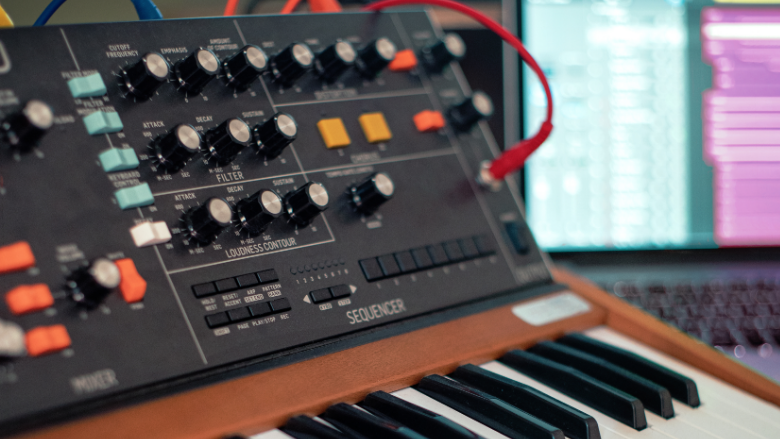
MIDI Connectivity and External Gear Integration
MIDI compatibility allows synths to be easily integrated into any setup, whether live or in the studio. One crucial aspect to consider is the synthesizer's MIDI compatibility, especially if you're working with other gear like drum machines, modular rigs, or DAWs. Most modern synths, whether analog or digital, come with MIDI connectivity, allowing you to control them from external hardware or software synths. The vast majority of synthesizers now include MIDI connectivity, making it easier for musicians to integrate them into their home studios or live setups. This is incredibly useful for live performances, where multiple instruments need to be synchronized or controlled from a master keyboard.Expanding with Modular Gear:
Synthesizers feature modular patch points, allowing you to interface with Eurorack systems or other modular setups. This integration gives you the flexibility to manipulate signals in ways that standalone synthesizers cannot. Modular synths add a significant level of depth to your sound palette, providing a wide range of modulation options, from manipulating frequencies to distorting signals in unique ways.Audio Inputs for Processing External Signals:
Some synthesizers offer audio inputs, allowing you to run external instruments like guitars, vocals, or drum machines through the synth's filter and modulation circuits. This creates unique sounds and allows you to use the synth as more than just a tone generator—turning it into a powerful audio processor.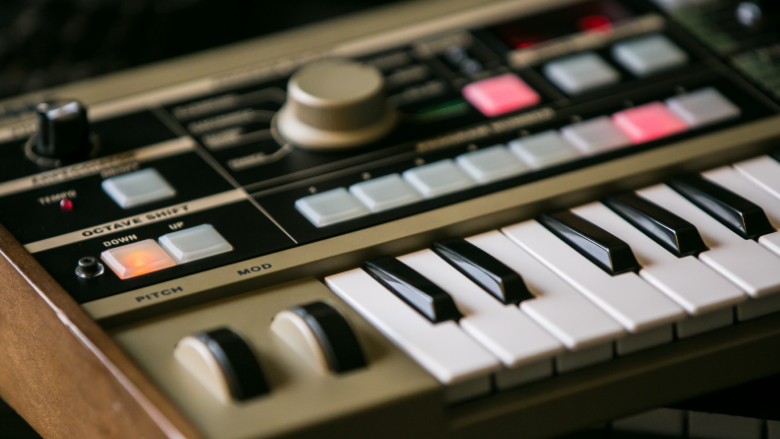
Modulation Sources and Artistic Potential
This is the secret weapon of synth engine enthusiasts, enabling dynamic changes in sound over time. Modulation is what breathes life into synthesizers, adding movement and depth to static tones. Whether it's controlling pitch with an LFO, adding vibrato, or sweeping through filter frequencies, modulation opens up the potential for creative sound manipulation. Many modern synths, such as the Korg Minilogue XD or the Sequential Prophet-5, include several modulation sources like envelopes, LFOs, and step sequencers. A great sequencer with modulation capabilities will allow you to program intricate patterns that evolve over time. Instruments with multiple modulation sources, like the Arturia MicroFreak, offer advanced features like randomization, which can produce unexpected and weird results, adding an element of surprise to your music. These sources can be applied to oscillators, filters, or even the stereo field, resulting in an expressive, evolving sound.Exploring Modulation Options:
- LFOs (Low-Frequency Oscillators): Often used for vibrato or tremolo effects but can be assigned to virtually any parameter.
- Envelopes: Control the dynamics of the sound, shaping its attack, decay, sustain, and release (ADSR).
- Step Sequencers: Program precise, repeating sequences that change over time, adding rhythm and movement to your patches.

